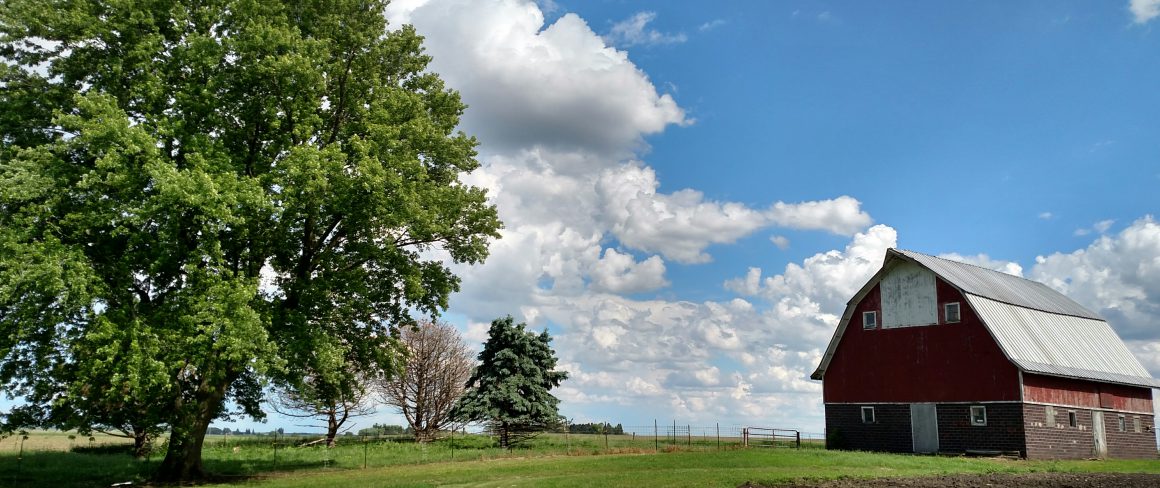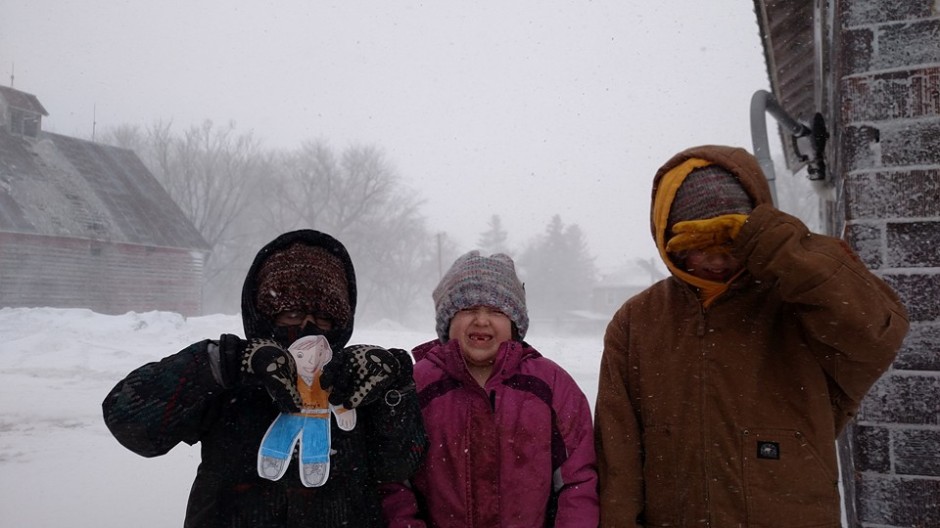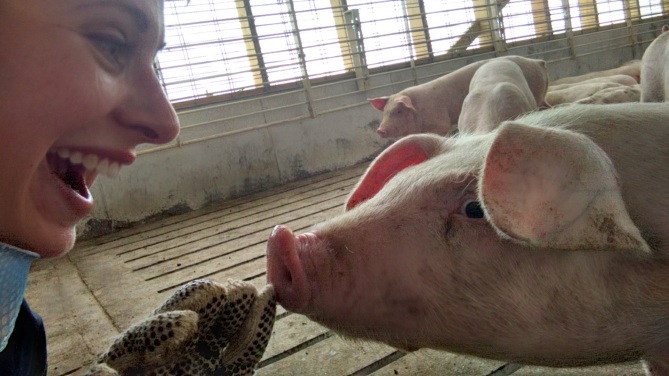
People have asked us a lot recently how our pig farming adventure is going. So let me take a moment to share with you how Piggytown is faring these days! Disclaimer: This entry is brought to you by Nicole, the city girl who began this adventure with NOT A CLUE about farming livestock, so if you are a farmer, let the laughter begin, if you are not, I believe this entry will give you an easy to understand window into our life of piggy farming.
We haven’t done a lot of updates because quite frankly the amount of energy that this first round of pigs has taken is a LOT! Neither of us have ever done this, which is why we are forever grateful to work with a company, called an “integrator” (who owns the pigs, instructs us how to care for them but pays us to house and chore them) that teaches us as we go.
Believe it or not, we are about finished with our first round of pigs. Our integrator had mercy on us this time and sent us “feeder pigs” rather than weaned babies, so they weighed 45-55 lbs when they arrived. Which means those little squeakers went from 50ish pounds to about 300lbs since October 1, you do the math, they are called pigs for a reason! We have had 1 semi load out to market…the rest will go out in the course of the next 4-6 weeks. Then we will start the process all over again, and again, and again.
The first 6 weeks were pretty challenging. Here is a look at what we learned early on:
Signs of sickness:
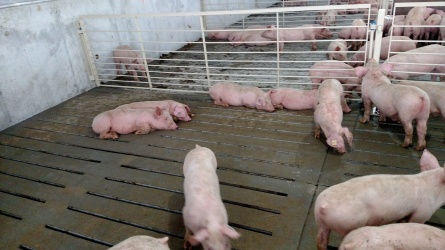
What does a sick pig look like? They all look the same, how do you spot a sick one? If a pig does look sick, how can I catch it and treat it accordingly? Um, have you ever tried to catch a pig?? Good luck, is all I have to say I learned about that one. They have stumpy little legs and even after you grab them, it’s like trying to hold onto a flailing toddler. Once you have caught the little bugger, you have to decide: Does it need moved to a “sick pen” to recover or does it need medicine in the form of a shot, if so, what kind? Oh yeah, and make sure you give the shot in the correct place (in it’s neck) while it’s trying to get away from you.
Let me just say I wimped out on chores after seeing what kind of strength, determination and dexterity catching a pig and giving a pig a shot entailed. Yes, I’m happy to help unload and load (maybe?), but whew, when it comes to daily chores…I hold a new and infinite level of admiration and respect for my husband and anyone else who chores pigs.
In regards to treating our piggies, we have learned a TON about how, when and what to use for medications under the guidance of our integrator’s vet and staff. When you find a sick pig, not only do you have to know how to treat that pig, but you have to assess if this pig is an isolated incident or if the whole herd is getting sick and needs treatment. If you want to know more about responsible use of individual treatment vs. mass treatments for pigs, we are happy to share with you our experience. In some cases a whole barn needs treatment or the death loss in a barn can be devastating. One of our barns (that’s 2,400 pigs!) began to come down with strep early on (yes, the kind humans get). But for pigs, strep infections can become quickly fatal and infect a whole barn. Early treatment is crucial.
We have also had to learn when to put a pig down (euthanize). Our company has a “no suffer” policy (which we support wholeheartedly!). This means if a pig is suffering with no chance to improve they are euthanized. I watched Grant learn how to do it, it’s hard to do physically and mentally (farmers have hearts and feelings too, we don’t like to see our animals suffer or die), but it’s better than watching a pig suffer (but both suck for the record).
Food, water, air, food, water, air…they need all 3 all the time!
The only reason we can raise 4,800 pigs and work day jobs is the amazing automated technology we have in our barns. Feed is automated! I wish they had this for kids! We have bulk bins with feed outside the barns. The semi pulls up, fills the bin, and the line goes straight to the barn, with a motorized auger system that delivers feed to each pen every 90 minutes. But let me just say, my husband spends many hours working on scheduling feed drop offs, and just because it’s automated, doesn’t mean it won’t clog, or break etc… Each day Grant spends time checking the equipment, pens and feed lines to be sure they are working properly and delivering sufficient amounts of feed. Because the last thing you want to deal with are pigs who are out of feed! They are not pleasant to deal with.
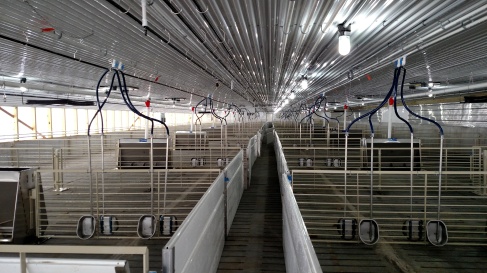
Water is automated too! Piggies are curious, so they will nose at everything, Including the little lever, called a nipple, that squirts out water into a basin for their enjoyment. My eldest son also found out that the pigs REALLY like it when you use the boot wash station to give them a little shower. Automated water is good, unless you have a waterer that is malfunctioning. If the waterer is stuck on, you not only waste water, but your daily records of how much the pigs are drinking will be skewed. Did you know you can tell if pigs are getting sick by how much water they are drinking? Think about it, if you are sick, you often don’t eat and drink as well. Grant charts daily water intake so he can tell if the pigs have changed habits.
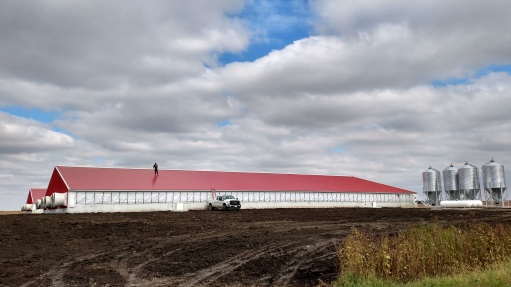
Air flow is regulated automatically as well. Our barns are “tunnel vent” barns, with fans on one end that suck air through the building to keep consistent temperatures throughout the barn. Each barn has curtains on the end and inlets in the ceiling so the fans are pulling fresh air into the barn. The computer has different “stages” to automatically ventilate according to the needs. If the temperature rises because the pigs are getting bigger and have more body heat, or it’s warmer outside, more of the fans kick on. The side curtains on our type of barn only drop during an emergency such as a power outage. All these gadgets have to be checked daily to make sure the computer and the equipment are working properly.
In a nutshell, the first six weeks required learning the basics of pig care and our facility. One might ask…How long does all of this take on a regular basis? The single most important thing I learned the first 6 weeks (and still to this day), it’s that you never, I repeat never, assume you know how long it will take. Grant spent anywhere from 1.5-6 hours a day in the barn doing all of the above. Sometimes he would have to leave and come back to finish. But the beauty of the automated barns is most of his time is spent on direct care for the pigs. So if the pigs aren’t well, things take longer.
Every day begins at 5am, which isn’t uncommon in the farming world. Grant heads to the hog barn by 6am and I get all the kids and our barn animals on our homestead ready for the day. Then when all is well with kids and animals we move on to our church work.
That’s a look at our early learnings, stay tuned for our next installment of Lessons in Pig farming, maybe you’ll even hear from the pig farmer himself…
